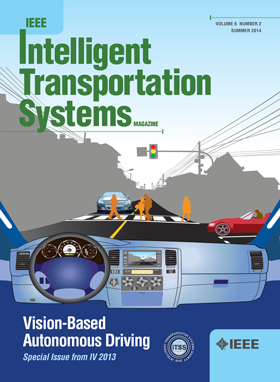基于精确换乘行为模型的公交网络设计、时刻表和乘客分配联合优化
IF 8.4
1区 工程技术
Q1 ENGINEERING, CIVIL
IEEE Transactions on Intelligent Transportation Systems
Pub Date : 2025-06-09
DOI:10.1109/TITS.2025.3573284
引用次数: 0
摘要
本文研究了基于精确换乘行为模型的公交网络设计、时刻表和乘客分配的联合优化问题。将该问题表述为一个双层混合整数双线性规划,以捕捉乘客的现实路径选择行为。上层模型的目标是使公交线路建设成本、公交线路运营成本、公交站点建设成本、乘客出行时间、公交线路到站失败造成的延误、公交线路换乘失败造成的延误、公交线路满负荷运行时的溢出延误的加权和最小。下层模型的目的是尽量减少乘客的出行时间。将乘客的出行时间表示为等待上车时间、换乘时间和车内出行时间的总和。通过对公交换乘行为的精确建模,确定了公交换乘时间和换乘失败造成的延误。利用Karush-Kuhn-Tucker条件,将该双层混合整数双线性规划转化为具有平衡约束的等效混合整数双线性规划。为了在不需要大量计算机内存的情况下寻求模型的高质量解,提出了一种结合分段线性化的Benders分解算法。数值应用表明,假设乘客换乘时间为车头时距的一半,该模型的总成本比基线模型低3.49%。本文章由计算机程序翻译,如有差异,请以英文原文为准。
Joint Optimization of Transit Network Design, Timetable, and Passenger Assignment With Exact Transfer Behavior Modeling
This study investigates the problem of joint optimization of transit network design, timetable, and passenger assignment with exact transfer behavior modeling. The problem is formulated as a bi-level mixed-integer bilinear program to capture passengers’ realistic path choice behavior. The upper-level model aims to minimize the weighted sum of the cost of bus route construction, bus route operation, bus station construction, travel time of passengers, the delay caused by failures in aboarding to the bus trips at the origin, the delay caused by failures in transfer between the bus trips, and the overflow delay when the bus trip operates at capacity. The lower-level model aims to minimize the travel time of passengers. The travel time of passengers is formulated as the sum of the waiting time for boarding, the transfer time, and the in-vehicle travel time. The passenger transfer time and the delay caused by failures in transfer between the bus trips are formulated with exact modeling of passenger transfer behavior. This bi-level mixed-integer bilinear program is transformed into an equivalent mixed-integer bilinear program with equilibrium constraints using Karush-Kuhn-Tucker conditions. To seek a solution of good quality to the proposed model while not requiring a large amount of computer memory, a Benders decomposition algorithm integrated with piecewise linearization is developed. A numerical application demonstrates that the proposed model is able to achieve 3.49% lower total cost than the baseline model assuming passenger transfer time to be half of the headway.
求助全文
通过发布文献求助,成功后即可免费获取论文全文。
去求助
来源期刊

IEEE Transactions on Intelligent Transportation Systems
工程技术-工程:电子与电气
CiteScore
14.80
自引率
12.90%
发文量
1872
审稿时长
7.5 months
期刊介绍:
The theoretical, experimental and operational aspects of electrical and electronics engineering and information technologies as applied to Intelligent Transportation Systems (ITS). Intelligent Transportation Systems are defined as those systems utilizing synergistic technologies and systems engineering concepts to develop and improve transportation systems of all kinds. The scope of this interdisciplinary activity includes the promotion, consolidation and coordination of ITS technical activities among IEEE entities, and providing a focus for cooperative activities, both internally and externally.
 求助内容:
求助内容: 应助结果提醒方式:
应助结果提醒方式:


